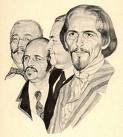It's Never Really Enough, Is It?
So, how much money do or will we need to retire comfortably? And what does that mean exactly anyway...comfortably? I think a reasonable definition is: Will Mrs. BoomVista let me buy a new car when I want to? OK, more seriously, a reasonable definition is: Enjoying your retirement while spending wisely and modestly and, most importantly, without becoming obsessed by your bank account or net worth.
I think a reasonable definition is: Will Mrs. BoomVista let me buy a new car when I want to? OK, more seriously, a reasonable definition is: Enjoying your retirement while spending wisely and modestly and, most importantly, without becoming obsessed by your bank account or net worth.
Coop, a loyal BoomVista, sends along some advice that passed through his computer the other day. It comes from a firm called Daniel A. White Associates, which says it "solely serves the financial needs of those nearing retirement and those already retired."
Much of it is pretty obvious, but it never hurts to review the obvious. Here is the material, which some bracketed remarks from BoomVista:
As retirement rolls into view for the Baby Boomer generation, many people are wondering if their nest egg will provide the quality of life they have been dreaming about for so many years.
There is no universally accepted method for calculating how much money is needed to cover retirement expenses. But a comprehensive evaluation of your financial situation will improve the accuracy of whatever planning tool you use to measure your nest egg. Here is a summary of information you will need.
- Retirement expenses. Start by figuring out current living expenses, then determine what will change in retirement. Most retirees spend less on expenses like food [Huh?] and clothing, but many spend more on travel and second homes. Don't forget health care when estimating your annual retirement budget in today's dollars. [That's certainly the biggie, isn't it? BoomVista's plan - Have Mrs. BoomVista continue working for the health insurance...pretty much forever. :) ]
- Cash flow sources. Be conservative on what you expect from Social Security, although President Bush has promised full benefits for everyone born before 1950. [See this previous post.] Pensions, annuities and reverse mortgages will reduce the amount you need to withdraw from investment accounts. [Many other experts advise extreme caution when considering reverse mortgages.]
- Future events. Downsizing to a smaller home or selling property will add to your nest egg. Money you expect to inherit should be included in your calculations.
- Investment return and risk. How much risk you are willing to take will affect how fast your nest egg grows and how safe it is after your retire. While you are still working, you can take more risks to increase investment returns because you will have time to recover from a stock market setback. But once you've retired, it's advisable to reduce investment risk in order to protect your nest egg from sudden declines in value when you need to make withdrawals.
- Retirement date. People who work past 65 will have a bigger nest egg and fewer years of retirement expenses to cover. [They also will get more work-related aggravation.] Some retirees have found they should have kept their jobs for a few more years.
- Expect the unexpected. Don't rely on formulas based on average investment return, inflation and longevity rates, because deviations from the norm can throw off projections. [This is good advice.}
- Keep saving. The best way to improve your odds for a carefree retirement is to keep adding to your nest egg. [Duh.]

1 comment:
Wow. Good thing I do not have to worry about that for a long time...
Post a Comment